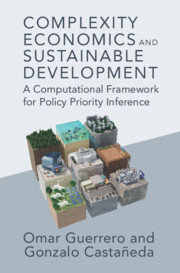 Complexity Economics and Sustainable Development
Complexity Economics and Sustainable Development Book contents
- Frontmatter
- Dedication
- Contents
- Figures
- Tables
- Foreword
- Acknowledgments
- Abbreviations
- Part I A Complexity Approach to Sustainable Development
- Part II A Global View of Sustainable Development
- Part III A Focalised View of Sustainable Development
- 10 Subnational Development and Fiscal Federalism
- 11 Accelerators and Systemic Bottlenecks
- 12 Deprivation, Income Shocks, and Remittances
- 13 Lessons and Reflections
- Bibliography
- Index
10 - Subnational Development and Fiscal Federalism
from Part III - A Focalised View of Sustainable Development
Published online by Cambridge University Press: 04 January 2024
- Frontmatter
- Dedication
- Contents
- Figures
- Tables
- Foreword
- Acknowledgments
- Abbreviations
- Part I A Complexity Approach to Sustainable Development
- Part II A Global View of Sustainable Development
- Part III A Focalised View of Sustainable Development
- 10 Subnational Development and Fiscal Federalism
- 11 Accelerators and Systemic Bottlenecks
- 12 Deprivation, Income Shocks, and Remittances
- 13 Lessons and Reflections
- Bibliography
- Index
Summary
This chapter investigates how federal transfers can boost subnational development. We analyse the case of Mexico and its 32 federal states. For this, we assemble a balanced dataset with 103 social, economic, and environmental indicators for each state. First, we study how federal transfers impacted state-level development during the sample period. Second, we analyse how changes in the distribution of transfers across states affect the indicators’ average evolution when attempting to foster all SDGs or each of them. We find that ‘fiscal contributions’ – a particular form of government transfers aimed at equalising regional disparities – exert an average impact on SDGs of around 25%–45%. Likewise, our simulations indicate that it is possible to achieve substantial impact gains when using an ‘optimal fiscal transfer’ to allocate the total federal transfers across SCGs.
Keywords
- Type
- Chapter
- Information
- Complexity Economics and Sustainable DevelopmentA Computational Framework for Policy Priority Inference, pp. 265 - 288Publisher: Cambridge University PressPrint publication year: 2024
